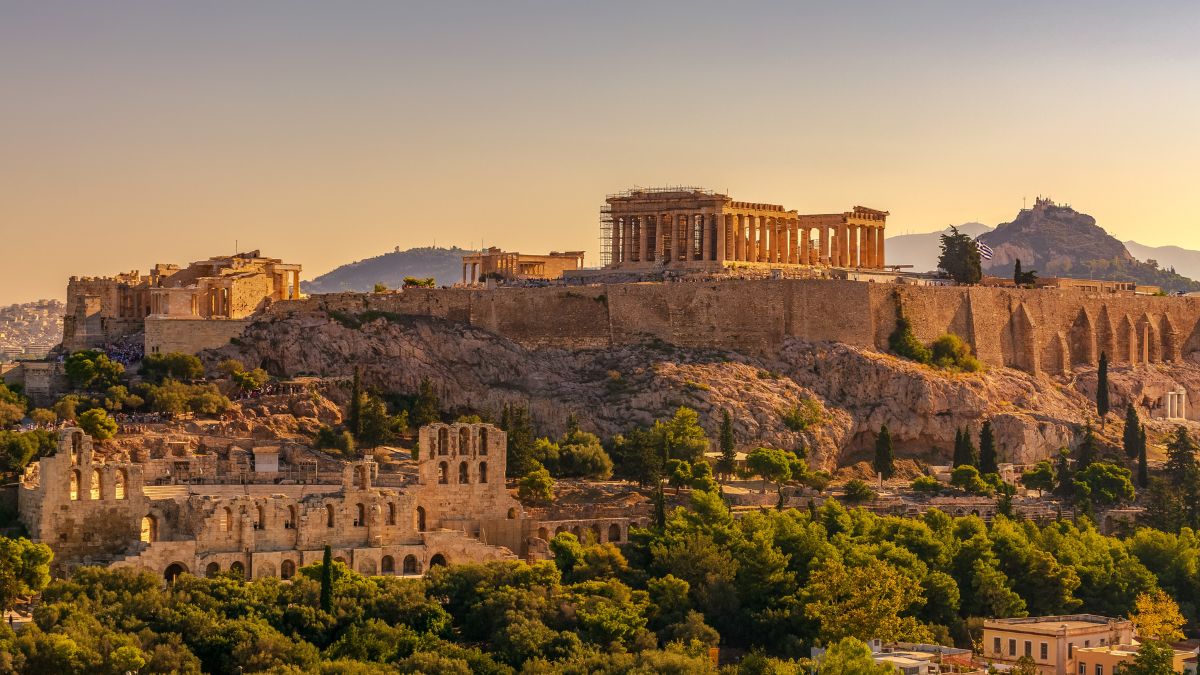50 Facts About Greece You Need to Know Before Traveling There

As participants in Amazon Associates and other programs, we earn from qualifying purchases. This comes at no additional cost to you. For more details, see our Affiliate Disclosure.
Before embarking on a journey to the cradle of Western civilization, there are countless marvels and nuances about Greece that beckon your curiosity. From the sun-kissed shores of the Aegean to the summit of Olympus, the land of myths and muses hides a mosaic of cultural, historical, and natural wonders. This guide, “50 Facts About Greece You Need to Know Before Traveling There,” promises to enrich your adventure with insights spanning ancient ruins, culinary delights, and the unwavering spirit of its people. Prepare to delve into a world where the past dances with the present, and the breathtaking landscapes tell tales as old as time itself.
1. The Birthplace of Democracy
Greece is revered as the birthplace of democracy, with its origins tracing back to Athens in the 5th century BCE. This revolutionary concept of governance allowed citizens to participate directly in political decision-making, laying the foundational principles of democracy as we understand it today. The ancient Athenian experiment in governance, especially its assembly and courts, influences modern democratic systems around the world, emphasizing the importance of civic responsibility and the power of the collective voice.
2. The Land of Gods and Myths
Greece’s rich tapestry of gods and myths captures the essence of its ancient culture, where deities like Zeus, Athena, and Poseidon played central roles in the lives of the people, symbolizing natural forces and human virtues. These myths, passed down through generations, are not just stories but are integral to understanding ancient Greek philosophy, culture, and the way they interpreted the world around them. Today, these tales continue to fascinate, offering insights into human nature and the ancient world.
3. Home to 18 UNESCO World Heritage Sites
Greece is home to 18 UNESCO World Heritage Sites, a testament to its rich history and cultural significance. From the Acropolis of Athens, symbolizing the apogee of artistic achievement, to the medieval city of Rhodes, each site offers a unique window into the past, showcasing Greece’s contribution to world heritage. These sites are not only archaeological treasures but also beacons of learning, offering unparalleled insights into ancient civilizations.
4. The Concept of Hospitality: Philoxenia
Philoxenia, translating to “friend to a stranger,” is a hallmark of Greek culture, reflecting the nation’s deep-rooted belief in generosity and hospitality. This tradition is so ingrained that it can be traced back to ancient times, where Zeus was considered the protector of guests. Today, visitors to Greece can expect to be welcomed with open arms, experiencing this enduring tradition that extends beyond mere politeness to embody a genuine warmth and respect for others.
5. Greece Has Over 6,000 Islands
Greece’s vast archipelago comprises over 6,000 islands and islets scattered across the Aegean and Ionian Seas, of which only 227 are inhabited. This makes Greece an ideal destination for travelers seeking diverse experiences, from the cosmopolitan allure of Mykonos to the serene beauty of Santorini. Each island boasts its unique charm, offering a blend of breathtaking landscapes, ancient ruins, vibrant local cultures, and pristine beaches.
6. The Invention of the Olympic Games
The Olympic Games, a cornerstone of ancient Greek culture, were originally held in Olympia from the 8th century BCE to the 4th century AD. Dedicated to Zeus, these games were not just athletic competitions but also a celebration of peace and unity among the city-states. The modern Olympic Games, revived in 1896, continue to be inspired by this ancient tradition, promoting values of excellence, friendship, and respect across the globe.
7. A Culinary Odyssey: Greek Cuisine
Greek cuisine is a flavorful odyssey that reflects the country’s history and geography, characterized by its simplicity and the use of fresh, quality ingredients. Dishes such as moussaka, souvlaki, and tzatziki highlight the Mediterranean diet’s health benefits, rich in olive oil, grains, wine, and seafood. Greek cuisine is a testament to the country’s ability to blend tradition and innovation, offering a gastronomic experience that is both rich in flavor and history.
8. The Legendary Mount Olympus
Mount Olympus, standing majestically at 2,917 meters, is not only Greece’s highest peak but also one of its most significant mythological sites. Known as the home of the Olympian gods, its peaks were considered in ancient times as a place where heaven and earth met. Today, Mount Olympus attracts climbers and mythology enthusiasts alike, offering breathtaking natural beauty and a touch of the divine.
9. The Rich Tradition of Greek Folk Music
Greek folk music, with its diverse regional styles, is an integral part of the nation’s cultural identity. Instruments like the bouzouki and lyra accompany songs that tell tales of love, loss, and heroism, reflecting the Greek soul’s depth and resilience. This music is not just entertainment but a living tradition that connects Greeks to their history and to each other, celebrated in festivals and social gatherings across the country.
10. An Archipelago of Unique Flora and Fauna
Greece’s islands and mainland host a unique array of flora and fauna, shaped by the country’s varied climates and topographies. From the wildflowers of Crete to the rare birds of the Aegean islands, Greece’s biodiversity is a treasure for nature lovers. The nation’s commitment to conservation is evident in its national parks and protected areas, safeguarding these natural wonders for future generations.
11. The Vibrant Capital: Athens
Athens, a city where ancient and modern coexist harmoniously, is the vibrant capital of Greece. Home to iconic landmarks like the Acropolis and Parthenon, Athens offers a unique blend of historical grandeur and contemporary culture. Its streets are alive with lively markets, avant-garde art, and an exuberant dining scene, making it a city that never ceases to fascinate. Athens not only serves as the heart of Greece’s political and economic spheres but also stands as a testament to the enduring legacy of its ancient past.
12. The Azure Beauty of the Aegean Sea
The Aegean Sea, with its deep blue waters and scattered islands, is a defining feature of the Greek landscape. This sea has been a cradle of ancient civilizations, facilitating trade and cultural exchange between Europe and Asia. Today, its crystal-clear waters and stunning islands are a paradise for sailors, beach lovers, and history enthusiasts alike, offering some of the world’s most breathtaking sunsets and unique maritime experiences.
13. Santorini: A Volcanic Wonderland
Santorini, known for its stunning sunsets, white-washed buildings, and blue-domed churches, is a volcanic island that offers breathtaking views over the Aegean Sea. The island’s unique geography is the result of a massive volcanic eruption, shaping its cliffs and creating its famous caldera. Santorini’s volcanic soil also contributes to its distinctive wines and produce, making it a destination not only of unparalleled beauty but also of culinary delight.
14. The Historic Battle of Thermopylae
The Battle of Thermopylae, fought in 480 BCE, remains one of history’s most legendary military stands. This conflict saw a small Greek force, led by King Leonidas of Sparta, make a heroic stand against the much larger Persian army of Xerxes I. The battle exemplifies the courage and valor of the Greeks and has become a symbol of resistance against overwhelming odds, inspiring countless works of art and literature through the ages.
15. The World’s Third Leading Producer of Olives
Greece’s landscapes are dotted with olive groves, testament to the country’s status as the world’s third leading producer of olives. This ancient tree symbolizes peace and prosperity and has been a staple of Greek life for thousands of years, providing nourishment, medicine, and oil. Greek olive oil, renowned for its quality and health benefits, is a cornerstone of Greek cuisine and a prized export, embodying the richness of the Mediterranean diet.
16. The Mystique of the Oracle of Delphi
The Oracle of Delphi, situated on the slopes of Mount Parnassus, was considered the center of the world in ancient Greek religion. Kings and commoners alike would journey here to seek advice from the Pythia, the priestess of Apollo, who delivered cryptic predictions that influenced major decisions and shaped the ancient world. Today, the ruins of Delphi attract scholars and tourists, drawn to its mystique and its pivotal role in Greek culture and history.
17. The Spectacular Samaria Gorge
The Samaria Gorge, nestled in the White Mountains of Crete, is one of Europe’s longest and most spectacular gorges. This natural wonder stretches over 16 kilometers, offering hikers a challenging yet rewarding journey through its dramatic landscapes. The gorge is also a biosphere reserve, home to rare flora and fauna, including the endangered Cretan wild goat. It exemplifies Greece’s commitment to preserving its natural heritage.
18. The Tradition of Name Days
In Greece, name days are celebrated with more enthusiasm than birthdays, rooted in the Orthodox Christian tradition of honoring the feast day of the saint that individuals are named after. These celebrations are a time for open houses, where friends and family gather, offering well-wishes and gifts. The tradition underscores the importance of community and religious observance in Greek culture, fostering social bonds and communal spirit.
19. Greek: One of the Oldest Languages
The Greek language, with its rich history and influence on many languages worldwide, is one of the oldest recorded living languages. Its literary tradition spans over 2,500 years, encompassing classical works that are foundational to Western literature, science, and philosophy. Modern Greek retains much of the vocabulary and grammatical structure of its ancient counterpart, serving as a living link to the past and a vital element of Greek identity.
20. The Enchanting Blue Caves of Zakynthos
The Blue Caves of Zakynthos are a natural marvel, known for their striking blue waters that reflect the sky’s color, creating a mesmerizing effect. Formed by erosion, these sea caves are accessible only by boat, offering visitors an unforgettable experience as they swim or sail through the luminous blue light. They epitomize the beauty of the Greek islands, combining natural wonder with serene tranquility.
21. The Importance of the Sea to Greek Culture
The sea has always been central to Greek life, shaping its culture, economy, and mythology. Greece’s extensive coastline and countless islands have fostered a deep connection with the sea, evident in its mythology, cuisine, and history as a maritime power. This bond is celebrated through maritime festivals and the tradition of seamanship, reflecting the Greeks’ respect for the sea’s bounty and its role in their collective identity.
22. Minoan Civilization: Europe’s Oldest
The Minoan civilization, flourishing on Crete from approximately 2700 to 1420 BCE, stands as Europe’s oldest civilization. Renowned for its sophisticated art, architecture, and complex social structure, the Minoans left a lasting legacy through the ruins of palaces such as Knossos. These sites offer invaluable insights into early European history, showcasing advanced urban planning and a rich cultural life that predates classical Greek society.
23. The Architectural Marvels of Ancient Greece
Ancient Greek architecture has left a timeless mark on the world, epitomized by structures such as the Parthenon, which symbolize the ideals of order, beauty, and proportion. These architectural marvels were not merely buildings but expressions of philosophical and political ideals, many of which laid the foundation for Western architectural thought. Their influence is still seen in the neoclassical facades of modern cities, reflecting ancient Greece’s enduring impact.
24. The Legendary City of Atlantis and Greek Lore
The legend of Atlantis, first mentioned by Plato, has captivated imaginations for centuries as a tale of a utopian society that vanished beneath the waves. This story, while a subject of speculation and exploration, illustrates the Greeks’ fascination with the power of nature, the virtues of society, and the impermanence of human achievements. Atlantis remains a pivotal part of Greek lore, embodying the blend of history, mythology, and philosophy that characterizes Greek culture.
25. Greek Coffee Culture
Greek coffee culture is an integral part of daily life, offering a moment of leisure and community. Traditional Greek coffee is brewed slowly over low heat, resulting in a strong, rich flavor, and is often accompanied by lively conversation. Coffee houses, or kafeneia, serve as social hubs in both urban and rural settings, where people of all ages gather to discuss everything from politics to family life, underscoring the role of communal spaces in Greek society.
26. The Impact of Byzantine Art and Architecture
Byzantine art and architecture, with its distinctive style and religious focus, represents a significant era in Greek history that bridged the classical and modern worlds. The Hagia Sophia, with its magnificent dome and intricate mosaics, exemplifies Byzantine architectural ingenuity and aesthetic. Byzantine influence extends to Orthodox churches across Greece, where icons and frescoes continue to inspire devotion and admiration for their beauty and spiritual depth.
27. The Historical Significance of the Greek Alphabet
The Greek alphabet, developed around the 9th century BCE, was a groundbreaking advancement in written language, introducing vowels and providing the basis for the alphabets of many other languages, including Latin and Cyrillic. Its creation allowed for the recording of works in philosophy, history, and literature, effectively preserving Greek cultural achievements and facilitating their transmission through the ages.
28. The Tradition of Kalamatianos Dance
The Kalamatianos dance, a traditional Greek folk dance, is a symbol of unity and community spirit. Performed in a circle, it reflects the importance of social cohesion and is a staple at celebrations such as weddings, festivals, and national holidays. This dance, along with other folk dances, plays a crucial role in preserving Greek cultural identity, passing down traditions and values through generations.
29. Greece’s Natural Hot Springs
Greece’s geographical diversity includes numerous natural hot springs, revered since antiquity for their therapeutic properties. Sites like Loutraki and Edipsos have been destinations for health and relaxation for centuries, drawing visitors seeking the healing benefits of mineral-rich waters. These springs, set against stunning natural backdrops, offer a glimpse into the ancient Greek emphasis on balance and well-being.
30. The Wine Heritage of Greece
With a winemaking tradition that dates back over 4,000 years, Greece boasts a rich wine heritage characterized by a diverse range of indigenous grape varieties. Regions such as Santorini, Nemea, and Crete produce wines that reflect the unique terroirs of Greece, combining ancient techniques with modern innovations. Greek wines, from the robust reds to the aromatic whites, invite connoisseurs and casual drinkers alike to explore the depth of Greece’s viticultural legacy.
31. The Sacred Rock of Acropolis
The Acropolis of Athens, crowned by the Parthenon, stands as a symbol of the glory of ancient Greece and its enduring legacy. This sacred rock serves not only as a monumental nexus of architectural brilliance but also as a testament to the artistic, philosophical, and political heights achieved by the Athenians. Visiting the Acropolis offers a profound insight into the ancient world, where democracy, art, and philosophy flourished, shaping the foundation of Western civilization.
32. The Lush Landscape of the Pelion Peninsula
The Pelion Peninsula, a verdant gem in the heart of Greece, offers a landscape where myth intertwines with natural beauty. According to legend, Pelion was home to the centaurs and the site of the wedding between Thetis and Peleus, parents of Achilles. Today, Pelion’s lush forests, pristine beaches, and traditional villages attract those seeking to experience Greece’s natural splendor and mythological past.
33. The Naval Power of Ancient Greece
Ancient Greece’s dominance as a naval power was pivotal to its economic success and military prowess, particularly for city-states like Athens. The development of the trireme, a fast and agile warship, allowed Greeks to protect their trade routes and exert influence across the Aegean Sea and beyond. Naval victories, such as the Battle of Salamis, underscored the strategic importance of naval power in shaping the course of Greek, and world, history.
34. Greek Philosophers and the Pursuit of Knowledge
Greek philosophers, from Socrates to Aristotle, laid the groundwork for Western philosophy, engaging with questions of ethics, metaphysics, and the nature of knowledge itself. Their dialogues and treatises explored the potential of human reason and the pursuit of the good life, influencing countless generations of thinkers. The legacy of Greek philosophy endures, continuing to inspire the quest for understanding and the value of questioning.
35. The Tranquil Waters of the Ionian Sea
The Ionian Sea, with its calm waters and stunning shades of blue, borders Greece’s western coast. Renowned for its picturesque islands, such as Corfu, Kefalonia, and Zakynthos, the Ionian Sea offers a serene retreat with beautiful beaches, lush landscapes, and Venetian influences. Its tranquil beauty and rich history make it a beloved destination for those seeking relaxation and exploration in a breathtaking setting.
36. The Majestic Meteora Monasteries
Perched atop towering rock formations in central Greece, the Meteora monasteries are a breathtaking sight, blending natural beauty and spiritual solace. These monasteries, dating back to the 14th century, were built by monks seeking refuge and isolation, creating a place of peace and contemplation. Today, Meteora is not only a UNESCO World Heritage Site but also a testament to the human spirit’s resilience and devotion.
37. The Greek Tradition of Easter Celebrations
Easter in Greece is a profound and vibrant celebration, marked by unique traditions and deep spiritual significance. From the solemnity of Holy Week to the joyous Resurrection services, culminating in the midnight service and the breaking of the Lenten fast, Easter encapsulates the heart of Greek religious and community life. The lighting of candles, the fireworks, and the sharing of red-dyed eggs symbolize rebirth and hope, bringing together families and communities in a festive spirit.
38. The Byzantine Empire’s Lasting Legacy
The Byzantine Empire, with its capital in Constantinople, preserved and enhanced the cultural and intellectual heritage of the ancient Greek and Roman worlds. Its lasting legacy, seen in its art, architecture, and literature, continued to influence Eastern Europe and the Near East long after its decline. The Byzantine Empire’s contribution to Christian theology, Byzantine law, and its role in the preservation of ancient texts have left an indelible mark on history and civilization.
39. The Charming Old Town of Corfu
Corfu’s Old Town, a UNESCO World Heritage Site, is a charming blend of medieval fortresses, Venetian architecture, and vibrant Greek culture. Its narrow alleys, flanked by pastel-colored buildings and adorned with hanging laundry, lead to lively squares and hidden gardens. This enchanting town not only reflects Corfu’s rich history but also offers a lively atmosphere, with its cafes, shops, and local cuisine inviting exploration and enjoyment.
40. The Mythical River Styx
The River Styx, in Greek mythology, is the boundary between the Earth and the Underworld, a realm ruled by Hades. Souls of the deceased were ferried across the Styx by Charon, the boatman, into the afterlife. This mythological river embodies the Greeks’ beliefs about death and the afterlife, reflecting themes of morality, honor, and the eternal journey of the soul. The Styx’s legacy continues to influence modern literature and art, symbolizing ultimate boundaries and transitions.
41. The Revolutionary Figure of Alexander the Great
Alexander the Great, a king of Macedon in the 4th century BCE, is celebrated as one of history’s most influential military leaders. His unprecedented conquests spread Greek culture and language across the known world, from Egypt to India, creating the Hellenistic Age. Alexander’s legacy is not just one of military might but also of cultural fusion, as he sought to integrate the diverse peoples of his empire, leaving a profound impact on the subsequent course of world history.
42. Greek Influence on Western Literature
Greek literature, with its epic poems, tragedies, and comedies, has profoundly influenced Western literature. Homer’s “Iliad” and “Odyssey” laid the foundation for epic poetry, while the works of Sophocles, Euripides, and Aristophanes have defined the standards of tragedy and comedy. These texts explore universal themes such as heroism, fate, and the human condition, continuing to inspire writers and audiences alike, shaping the narrative arts for centuries.
43. The Iconic White and Blue of Cycladic Architecture
The Cycladic Islands, with their iconic white and blue architecture, epitomize the beauty of the Greek Aegean. This distinctive style, characterized by cubic houses, blue-domed churches, and narrow alleys, reflects the islands’ adaptation to their environment—maximizing light and resisting heat. Beyond aesthetics, this color scheme symbolizes the Greek sky and sea, embodying the nation’s deep connection with its natural surroundings and cultural heritage.
44. The Ancient Theatre of Epidaurus
The Ancient Theatre of Epidaurus, renowned for its exceptional acoustics and symmetry, is a masterpiece of classical Greek architecture. Built in the 4th century BCE, it was dedicated to Asclepius, the god of medicine, reflecting the close association between healing and the arts. This theater, still in use today for performances, demonstrates the Greeks’ understanding of aesthetics, acoustics, and human experience, highlighting the cultural significance of the performing arts in ancient Greek society.
45. The Unique Wildlife of Crete
Crete, Greece’s largest island, boasts a rich biodiversity, including unique species not found elsewhere. The island’s varied ecosystems, from mountainous regions to coastal areas, support a wide range of flora and fauna. The Cretan wildcat, the Griffon vulture, and the endemic Cretan ibex (kri-kri) are just a few examples of the island’s unique wildlife. Crete’s natural heritage is a testament to Greece’s broader commitment to preserving its rich biodiversity.
46. The Historical District of Plaka in Athens
Plaka, nestled at the foot of the Acropolis in Athens, is one of the city’s oldest and most picturesque districts. With its neoclassical architecture, winding streets, and vibrant marketplaces, Plaka offers a glimpse into the layers of history that have shaped Athens. This area, often referred to as the “Neighborhood of the Gods,” provides a lively blend of historical sites, traditional tavernas, and artisan shops, embodying the spirit and hospitality of Greek culture.
47. The Art of Greek Pottery and Sculpture
Greek art, particularly pottery and sculpture, has left a lasting legacy on the visual arts. Greek pottery, known for its geometric designs and later, more figurative works depicting myths and daily life, provides valuable insights into ancient Greek society. Similarly, Greek sculpture evolved from rigid forms to the Classical ideal of balanced beauty and realism, influencing Renaissance art and beyond. These artistic achievements reflect the Greeks’ pursuit of perfection and harmony in the human form.
48. The Breathtaking Caldera of Santorini
Santorini’s caldera, formed by one of the largest volcanic eruptions in history, offers some of the most dramatic landscapes in the world. The island’s cliffs, dotted with white villages overlooking the sea-filled crater, create a stunning visual contrast that attracts visitors from around the globe. This natural wonder, coupled with the island’s unique architecture and sunsets, makes Santorini a symbol of the beauty and power of the natural world.
49. The Role of the Greek Orthodox Church
The Greek Orthodox Church plays a pivotal role in the cultural and spiritual life of Greece, influencing everything from art and music to festivals and daily rituals. Its traditions and ceremonies are deeply intertwined with Greek identity and history, reflecting the enduring legacy of Byzantium. The church’s monasteries, icons, and liturgy continue to be central to Greek Christian practice, embodying a faith that has shaped the nation’s character and values.
50. The Legacy of the Marathon
The marathon race, a hallmark of modern athletics, owes its origins to the ancient Battle of Marathon in 490 BCE, where a Greek messenger purportedly ran from Marathon to Athens to announce the Persian defeat. This legendary run inspired the marathon event in the modern Olympic Games, symbolizing endurance, determination, and the human spirit’s capacity to overcome adversity. The marathon stands as a testament to the lasting influence of Greek history on global culture and sports.






